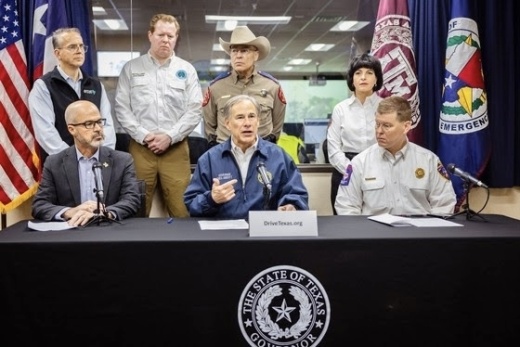At a Jan. 31 news conference in Austin, Abbott and other state officials shared an update on the state’s response to the severe weather.
Crews from the Texas Department of Transportation pretreated roads across the state for several days before the storm arrived, but TxDOT Executive Director Marc Williams said many roads are icy and unsafe to drive on. Bridges, ramps and other elevated roads are particularly likely to freeze, as they are more exposed to cold air than surface roads, according to AccuWeather.
Williams said road conditions will likely get worse before they get better and reminded Texans to exercise caution.
“If you must drive, slow down. If there’s any way you can avoid driving, please do so—please don’t get out on the roadways if you can allow that,” Williams said.
He said people who need to drive should expect delays, especially in rural areas. Motorists should ensure they have a full tank of gas and bring water, food, coats and blankets with them in case they become stopped or stranded, officials said.
Steve McCraw, director of the Texas Department of Public Safety, said a state trooper was seriously injured when “a person who was driving too fast for the conditions lost control of the vehicle and ran into our trooper.” The accident occurred in Navarro County, according to a tweet by state Rep. Cody Harris, R-Palestine.
A Travis County sheriff’s deputy was injured after he pulled over to help a semitruck driver on SH 130 northbound. Another semitruck slid off the roadway and the deputy was pinned under its tire, according to a news release. The Travis County Sheriff’s Office said he was taken to a local hospital and is expected to recover.
One person was killed in a 10-car collision in Austin, according to the Austin Fire Department. Meanwhile, the New York Times reported that one person died in a rollover accident on I-20 in Arlington.
Texans can visit www.drivetexas.org for live updates on road conditions, including ice and closures, throughout the state. Other resources, including a map of local warming centers, can be found on the Texas Division of Emergency Management website.
Power grid remains stableOvernight Texas will continue to see freezing temperatures, freezing rain, and icy conditions. That means any water on streets could refreeze, so please stay off the roads if possible. If you must drive, slow down and check up-to-date road conditions at https://t.co/gslgm5725r pic.twitter.com/uUrLwBazAr
— TxDOT (@TxDOT) January 31, 2023
As of 5:25 p.m. Jan. 31, over 35,000 customers did not have power across the state, according to the county-by-county map shared by PowerOutage.us. Local power outages can happen when ice accumulates on trees and power lines, knocking them down, said Peter Lake, chair of the Public Utility Commission of Texas.
Local power outages should be reported directly to Texans’ utility companies, Lake said. Contact information for your utility provider can be found on your electric bill, on the company’s website or through the PUC’s Storm Resources page.
“Most importantly, under no circumstances approach or touch a downed power line,” Lake said. “These power lines can still be energized and electrified, and they can electrify nearby objects like cars and fences.”
Lake reminded Texans to keep a safe distance and contact their local authorities if they see a downed power line, even if someone else is connected to the power line or otherwise in danger.
State leaders emphasized that local outages do not mean the Texas power grid is failing. Pablo Vegas, the CEO of the Electric Reliability Council of Texas, said there will be over 10,000 megawatts of power-generating reserves online throughout the week.If Winter Storm Mara causes power outages in your area, stay safe with these tips. https://t.co/FqCnn8Vql2 pic.twitter.com/1aPXEtqYsK
— TX Fire Marshal (@TXSFMO) January 31, 2023
“ERCOT has been preparing for Winter Storm Mara for the last several days, and we have all the resources that we need to ensure reliable operations during this event,” Vegas said. “The ERCOT grid is not expected to have any emergency conditions during this event, nor are we expecting to ask for [energy] conservation [by] any Texans.”
Officials said Texans should not worry about a repeat of Winter Storm Uri, which hit Texas nearly two years ago. Over two-thirds of Texans lost power during the February 2021 storm, and nearly half lost access to running water, according to previous reporting by Community Impact. At least 151 people died due to cold weather and other hazardous conditions during the storm.
Energy prices skyrocketed in the aftermath of Uri, with customers footing the bills. Lake said this will not happen again, due to reforms the PUC and ERCOT have implemented in order to limit maximum energy prices, winterize power facilities and ensure more power reserves are available.
There were no issues with the state grid during the December 2022 freeze, when temperatures fell below 20 degrees Fahrenheit in large portions of Texas. During extremely hot weather in July, ERCOT asked Texans twice to voluntary conserve energy, but did not issue any emergency alerts.
Abbott acknowledged that the demand for energy is increasing as Texas’ population grows rapidly. He said energy regulators will continue to enact reforms to strengthen the grid, and lawmakers will likely propose changes as well.
“The bottom line is this: We’re not going to end this [legislative] session without having strategies to make sure that we will be able to provide power to the people of [this] state for the next 40 years,” Abbott said.
Texas Railroad Commissioner Christi Craddick said more than enough natural gas is available to heat homes across the state throughout the storm. If Texans smell gas in their homes, they should turn off their gas supply and call their local distribution company. The Texas Railroad Commission regulates the state’s oil and gas industry, pipeline safety and more.
Icy branches weigh 30x more.
That causes major damage if they break.
Winter storm tips:
: https://t.co/Ely14xXFCT
: https://t.co/cPRKgqf1Yo
: https://t.co/tJEJwsKiyZ
: https://t.co/DOh0mH7oeo
: https://t.co/xqIbJ1QmZ2 pic.twitter.com/CJrLeTf1yn— Texas Department of Insurance (@TexasTDI) January 30, 2023





